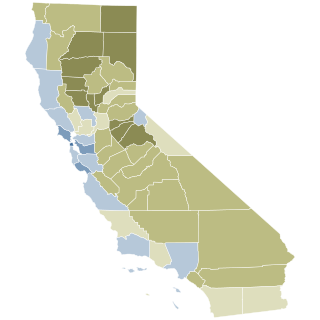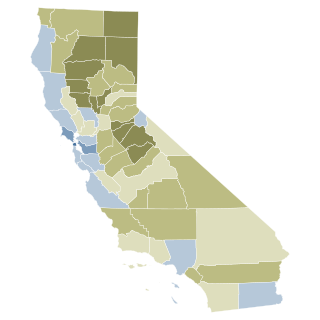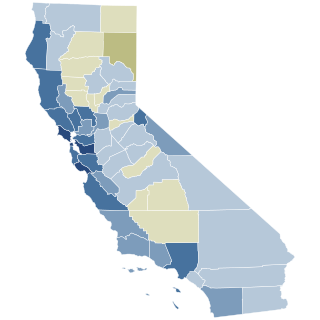
Proposition 13 is an amendment of the Constitution of California enacted during 1978, by means of the initiative process. The initiative was approved by California voters on June 6, 1978. It was upheld as constitutional by the United States Supreme Court in the case of Nordlinger v. Hahn, 505 U.S. 1 (1992). Proposition 13 is embodied in Article XIII A of the Constitution of the State of California.

In California, a ballot proposition is a referendum or an initiative measure that is submitted to the electorate for a direct decision or direct vote. If passed, it can alter one or more of the articles of the Constitution of California, one or more of the 29 California Codes, or another law in the California Statutes by clarifying current or adding statute(s) or removing current statute(s).

Proposition 218 is an adopted initiative constitutional amendment which revolutionized local and regional government finance and taxation in California. Named the "Right to Vote on Taxes Act," it was sponsored by the Howard Jarvis Taxpayers Association as a constitutional follow-up to the landmark property tax reduction initiative constitutional amendment, Proposition 13, approved in 1978. Proposition 218 was approved and adopted by California voters during the November 5, 1996, statewide general election.

A ballot proposition in the state of Arizona refers to any legislation brought before the voters of the state for approval.

A California Congressional Redistricting Initiative, Proposition 20 was on the November 2, 2010 ballot in California. It was approved by 61.2% of voters. Election officials announced on May 5 that the proposition had collected sufficient signatures to qualify for the ballot. The measure is known by its supporters as the VOTERS FIRST Act for Congress.

Proposition 27 was an unsuccessful ballot proposition on the November 2, 2010 ballot in California, placed there by the initiative process. If approved, this measure would have repealed California Proposition 11 (2008), which authorized the creation of the California Citizens Redistricting Commission to draw the electoral boundaries for State Assembly and State Senate districts. It would also have modified the provision in California law that says that proposed congressional districts can't be subjected to a veto referendum.
Bail in the United States refers to the practice of releasing suspects from custody before their hearing, on payment of bail, which is money or pledge of property to the court which may be refunded if suspects return to court for their trial. Bail practices in the United States vary from state to state.
A unified primary is an electoral system for narrowing the field of candidates for a single-winner election, similar to a nonpartisan blanket primary, but using approval voting for the first round, advancing the top-two candidates, allowing voters to confirm the majority-supported candidate in the general election.

Proposition 218 is an adopted initiative constitutional amendment in the state of California that appeared on the November 5, 1996, statewide election ballot. Proposition 218 revolutionized local and regional government finance in California. Called the “Right to Vote on Taxes Act,” Proposition 218 was sponsored by the Howard Jarvis Taxpayers Association as a constitutional follow-up to the landmark Proposition 13 property tax revolt initiative constitutional amendment approved by California voters on June 6, 1978. Proposition 218 was drafted by constitutional attorneys Jonathan Coupal and Jack Cohen.

Proposition 62 was a California ballot proposition on the November 8, 2016, ballot that would have repealed the death penalty and replaced it with life imprisonment and forced labor without possibility of parole. It would have applied retroactively to existing death sentences and increased the portion of life inmates' wages that may be applied to victim restitution.

The California state elections in 2020 were held on Tuesday, November 3, 2020. Unlike previous election cycles, the primary elections were held on Super Tuesday, March 3, 2020.

The Road Repair and Accountability Act of 2017, also known as the "Gas Tax", is a California legislative bill that was passed on April 6, 2017 with the aim of repairing roads, improving traffic safety, and expanding public transit systems across the state. The approval of the fuel tax was for a projected $52.4 billion, or $5.24 billion per year, to be raised over the next 10 years to fund the state's infrastructure. The bill passed primarily along party lines, with most Democrats supporting the bill while most Republicans were against it. The bill passed with a vote of 27–11 in the Senate and 54–26 in the Assembly. According to California Department of Transportation, for maintenance projects on state highways, while providing funding to enhance trade corridors, transit, and active transportation facilities, in addition to repairing local streets and roads throughout California.

California Proposition 6 was a measure that was submitted to California voters as part of the November 2018 election. The ballot measure proposed a repeal of the Road Repair and Accountability Act, which is also known as Senate Bill 1. The measure failed with about 57% of the voters against and 43% in favor.

California Proposition 69 was a legislatively referred constitutional amendment that appeared on ballots in California in the June primary election in 2018. This measure put the revenue from the Road Repair and Accountability Act, which increased fuel taxes, in a "lockbox" so that it can only be used for transportation-related purposes. It also exempts said gas tax revenue from the previously existing appropriations mandate and expenditures limit. This state constitution amendment ensures that revenues from SB1 Gas Taxes established by the Road Repair and Accountability Act of 2017 can only be used for transportation-related purposes.
In re Kenneth Humphrey was a case decided by the California Supreme Court concerning whether it is a violation of due process and equal protection to imprison defendants prior to trial solely because they cannot afford to pay bail.

Proposition 16 is a California ballot proposition that appeared on the November 3, 2020, general election ballot, asking California voters to amend the Constitution of California to repeal Proposition 209 (1996). Proposition 209 amended the state constitution to prohibit government institutions from considering race, sex, or ethnicity, specifically in the areas of public employment, public contracting, and public education. Therefore, Proposition 209 banned the use of race- and gender-based affirmative action in California's public sector.

California Proposition 15 was a failed citizen-initiated proposition on the November 3, 2020, ballot. It would have provided $6.5 billion to $11.5 billion in new funding for public schools, community colleges, and local government services by creating a "split roll" system that increased taxes on large commercial properties by assessing them at market value, without changing property taxes for small business owners or residential properties for homeowners or renters. The measure failed by a small margin of about four percentage points.

Proposition 21, an initiative statute for local rent control officially called the Expands Local Governments’ Authority to Enact Rent Control on Residential Property, was a California ballot proposition that appeared on the ballot for the general election on November 3, 2020 and was rejected. If approved, it would allow local governments to establish rent control on residential properties that have been occupied for over 15 years. It would also allow landlords who own no more than two homes to exempt themselves from such policies. This would essentially repeal some of the provisions in the 1995 Costa–Hawkins Rental Housing Act. Proposition 21 was rejected by 60% of California voters, just like Proposition 10 was before it.

Proposition 1, titled Constitutional Right to Reproductive Freedom and initially known as Senate Constitutional Amendment 10 (SCA 10), is a California ballot proposition and state constitutional amendment that was voted upon in the 2022 general election on November 8. Passing with more than two-thirds of the vote, the proposition amended the Constitution of California to explicitly grant the right to an abortion and contraceptives, making California among the first states in the nation to do so with Michigan and Vermont. The decision to propose the codification of abortion rights in the state constitution was precipitated in May 2022 by Politico's publishing of a leaked draft opinion showing the United States Supreme Court overturning Roe v. Wade and Planned Parenthood v. Casey in Dobbs v. Jackson Women's Health Organization, reversing judicial precedent that previously held that the United States constitution protected the right to an abortion.









